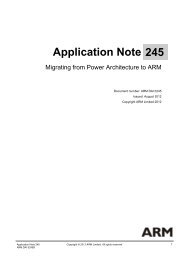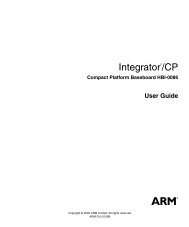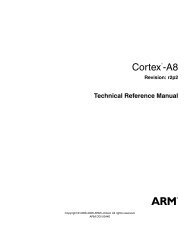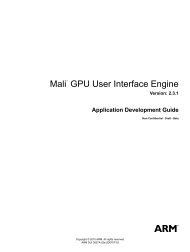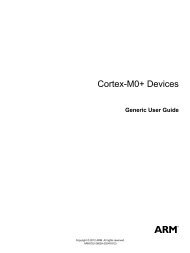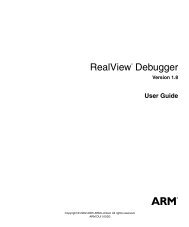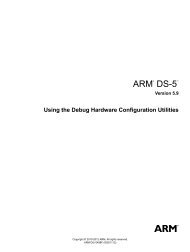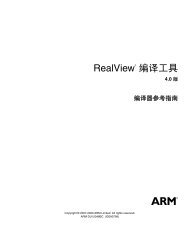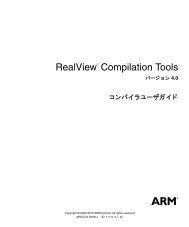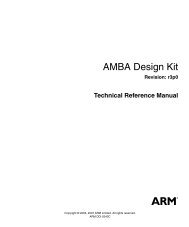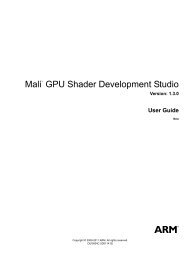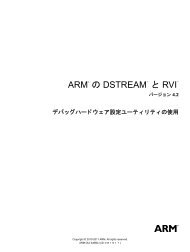- Page 1 and 2:
® RealView Compilation Tools Versi
- Page 3 and 4:
Product Status The information in t
- Page 5 and 6:
Contents RealView Compilation Tools
- Page 7 and 8:
Preface This preface introduces the
- Page 9 and 10:
Preface Appendix A Via File Syntax
- Page 11 and 12:
Preface Other publications The foll
- Page 13 and 14:
Chapter 1 Introduction This chapter
- Page 15 and 16:
Introduction 1.2 Source language mo
- Page 17 and 18:
Introduction 1.3 Language extension
- Page 19 and 20:
Introduction • Compiling a C sour
- Page 21 and 22:
Chapter 2 Compiler Command-line Opt
- Page 23 and 24:
Compiler Command-line Options 2.1.2
- Page 25 and 26:
Compiler Command-line Options Each
- Page 27 and 28:
Compiler Command-line Options Note
- Page 29 and 30:
Compiler Command-line Options • -
- Page 31 and 32:
Compiler Command-line Options Restr
- Page 33 and 34:
Compiler Command-line Options Defau
- Page 35 and 36:
Compiler Command-line Options • -
- Page 37 and 38:
Compiler Command-line Options • -
- Page 39 and 40:
Compiler Command-line Options Examp
- Page 41 and 42:
Compiler Command-line Options • a
- Page 43 and 44:
Compiler Command-line Options • -
- Page 45 and 46:
Compiler Command-line Options • -
- Page 47 and 48:
Compiler Command-line Options • -
- Page 49 and 50:
Compiler Command-line Options • -
- Page 51 and 52:
Compiler Command-line Options Synta
- Page 53 and 54:
Compiler Command-line Options • I
- Page 55 and 56:
Compiler Command-line Options See a
- Page 57 and 58:
Compiler Command-line Options 2.1.3
- Page 59 and 60:
Compiler Command-line Options Examp
- Page 61 and 62:
Compiler Command-line Options 2.1.4
- Page 63 and 64:
Compiler Command-line Options Compi
- Page 65 and 66:
Compiler Command-line Options Synta
- Page 67 and 68:
Compiler Command-line Options Selec
- Page 69 and 70:
Compiler Command-line Options Note
- Page 71 and 72:
Compiler Command-line Options • R
- Page 73 and 74:
Compiler Command-line Options 2.1.6
- Page 75 and 76:
Compiler Command-line Options Defau
- Page 77 and 78:
Compiler Command-line Options Usage
- Page 79 and 80:
Compiler Command-line Options See a
- Page 81 and 82:
Compiler Command-line Options A num
- Page 83 and 84:
Compiler Command-line Options vfpv3
- Page 85 and 86:
Compiler Command-line Options Restr
- Page 87 and 88:
Compiler Command-line Options • -
- Page 89 and 90: Compiler Command-line Options Usage
- Page 91 and 92: Compiler Command-line Options See a
- Page 93 and 94: Compiler Command-line Options • -
- Page 95 and 96: Compiler Command-line Options The c
- Page 97 and 98: Compiler Command-line Options Usage
- Page 99 and 100: Compiler Command-line Options • -
- Page 101 and 102: Compiler Command-line Options Examp
- Page 103 and 104: Compiler Command-line Options Usage
- Page 105 and 106: Compiler Command-line Options • -
- Page 107 and 108: Compiler Command-line Options 2.1.1
- Page 109 and 110: Compiler Command-line Options The c
- Page 111 and 112: Compiler Command-line Options See a
- Page 113 and 114: Compiler Command-line Options Defau
- Page 115 and 116: Compiler Command-line Options Note
- Page 117 and 118: Compiler Command-line Options Synta
- Page 119 and 120: Compiler Command-line Options 2.1.1
- Page 121 and 122: Compiler Command-line Options 2.1.1
- Page 123 and 124: Compiler Command-line Options See a
- Page 125 and 126: Compiler Command-line Options Usage
- Page 127 and 128: Compiler Command-line Options 2.1.1
- Page 129 and 130: Compiler Command-line Options #incl
- Page 131 and 132: Compiler Command-line Options Defau
- Page 133 and 134: Compiler Command-line Options See a
- Page 135 and 136: Compiler Command-line Options 2.1.1
- Page 137 and 138: Compiler Command-line Options • -
- Page 139: Compiler Command-line Options Restr
- Page 143 and 144: Compiler Command-line Options • a
- Page 145 and 146: Compiler Command-line Options • -
- Page 147 and 148: Compiler Command-line Options See a
- Page 149 and 150: Compiler Command-line Options The i
- Page 151 and 152: Compiler Command-line Options 2.1.1
- Page 153 and 154: Compiler Command-line Options and a
- Page 155 and 156: Compiler Command-line Options Defau
- Page 157 and 158: Compiler Command-line Options Error
- Page 159 and 160: Chapter 3 Language Extensions This
- Page 161 and 162: Language Extensions 3.1.2 #include_
- Page 163 and 164: Language Extensions 3.2 C99 languag
- Page 165 and 166: Language Extensions 3.3 C99 languag
- Page 167 and 168: Language Extensions Restrictions Th
- Page 169 and 170: Language Extensions static int y =
- Page 171 and 172: Language Extensions 3.4.4 Dollar si
- Page 173 and 174: Language Extensions 3.5 Standard C+
- Page 175 and 176: Language Extensions Example 3-2 Lin
- Page 177 and 178: Language Extensions 3.6 Standard C
- Page 179 and 180: Language Extensions int counter __a
- Page 181 and 182: Language Extensions 3.6.12 Structur
- Page 183 and 184: Language Extensions 3.7 GNU languag
- Page 185 and 186: Language Extensions 3.7.5 Character
- Page 187 and 188: Language Extensions • You can use
- Page 189 and 190: Language Extensions Errors The comp
- Page 191 and 192:
Chapter 4 Compiler-specific Feature
- Page 193 and 194:
Compiler-specific Features Usage __
- Page 195 and 196:
Compiler-specific Features Return v
- Page 197 and 198:
Compiler-specific Features Example
- Page 199 and 200:
Compiler-specific Features Example
- Page 201 and 202:
Compiler-specific Features The func
- Page 203 and 204:
Compiler-specific Features Example
- Page 205 and 206:
Compiler-specific Features Note The
- Page 207 and 208:
Compiler-specific Features Usage Th
- Page 209 and 210:
Compiler-specific Features Syntax _
- Page 211 and 212:
Compiler-specific Features See also
- Page 213 and 214:
Compiler-specific Features __weak v
- Page 215 and 216:
Compiler-specific Features When a c
- Page 217 and 218:
Compiler-specific Features Examples
- Page 219 and 220:
Compiler-specific Features Usage If
- Page 221 and 222:
Compiler-specific Features 4.3 Func
- Page 223 and 224:
Compiler-specific Features 4.3.2 __
- Page 225 and 226:
Compiler-specific Features Note Thi
- Page 227 and 228:
Compiler-specific Features 4.3.11 _
- Page 229 and 230:
Compiler-specific Features 4.3.14 _
- Page 231 and 232:
Compiler-specific Features See also
- Page 233 and 234:
Compiler-specific Features 4.4 Type
- Page 235 and 236:
Compiler-specific Features • Bit-
- Page 237 and 238:
Compiler-specific Features 4.5 Vari
- Page 239 and 240:
Compiler-specific Features In parti
- Page 241 and 242:
Compiler-specific Features 4.5.5 __
- Page 243 and 244:
Compiler-specific Features Note You
- Page 245 and 246:
Compiler-specific Features See also
- Page 247 and 248:
Compiler-specific Features 4.5.14 _
- Page 249 and 250:
Compiler-specific Features Default
- Page 251 and 252:
Compiler-specific Features • Chap
- Page 253 and 254:
Compiler-specific Features Where: t
- Page 255 and 256:
Compiler-specific Features This pra
- Page 257 and 258:
Compiler-specific Features • __at
- Page 259 and 260:
Compiler-specific Features Example
- Page 261 and 262:
Compiler-specific Features See also
- Page 263 and 264:
Compiler-specific Features Note Bot
- Page 265 and 266:
Compiler-specific Features 4.7 Inst
- Page 267 and 268:
Compiler-specific Features opcode2
- Page 269 and 270:
Compiler-specific Features See also
- Page 271 and 272:
Compiler-specific Features Example
- Page 273 and 274:
Compiler-specific Features Syntax v
- Page 275 and 276:
Compiler-specific Features Where: p
- Page 277 and 278:
Compiler-specific Features Errors T
- Page 279 and 280:
Compiler-specific Features Syntax v
- Page 281 and 282:
Compiler-specific Features Restrict
- Page 283 and 284:
Compiler-specific Features 4.7.24 _
- Page 285 and 286:
Compiler-specific Features See also
- Page 287 and 288:
Compiler-specific Features 4.7.31 _
- Page 289 and 290:
Compiler-specific Features Errors T
- Page 291 and 292:
Compiler-specific Features See also
- Page 293 and 294:
Compiler-specific Features ptr poin
- Page 295 and 296:
Compiler-specific Features 4.7.39 _
- Page 297 and 298:
Compiler-specific Features 4.7.41 _
- Page 299 and 300:
Compiler-specific Features 4.7.44 A
- Page 301 and 302:
Compiler-specific Features Table 4-
- Page 303 and 304:
Compiler-specific Features Table 4-
- Page 305 and 306:
Compiler-specific Features Table 4-
- Page 307 and 308:
Compiler-specific Features 4.7.47 A
- Page 309 and 310:
Compiler-specific Features Table 4-
- Page 311 and 312:
Compiler-specific Features • __uh
- Page 313 and 314:
Compiler-specific Features 4.7.51 _
- Page 315 and 316:
Compiler-specific Features • Para
- Page 317 and 318:
Compiler-specific Features • Para
- Page 319 and 320:
Compiler-specific Features 4.7.55 _
- Page 321 and 322:
Compiler-specific Features 4.7.57 _
- Page 323 and 324:
Compiler-specific Features 4.7.58 _
- Page 325 and 326:
Compiler-specific Features See also
- Page 327 and 328:
Compiler-specific Features 4.7.61 _
- Page 329 and 330:
Compiler-specific Features 4.7.63 _
- Page 331 and 332:
Compiler-specific Features 4.7.65 _
- Page 333 and 334:
Compiler-specific Features 4.7.67 _
- Page 335 and 336:
Compiler-specific Features 4.7.69 _
- Page 337 and 338:
Compiler-specific Features 4.7.71 _
- Page 339 and 340:
Compiler-specific Features 4.7.73 _
- Page 341 and 342:
Compiler-specific Features 4.7.75 _
- Page 343 and 344:
Compiler-specific Features 4.7.77 _
- Page 345 and 346:
Compiler-specific Features 4.7.79 _
- Page 347 and 348:
Compiler-specific Features 4.7.81 _
- Page 349 and 350:
Compiler-specific Features 4.7.82 _
- Page 351 and 352:
Compiler-specific Features 4.7.84 _
- Page 353 and 354:
Compiler-specific Features See also
- Page 355 and 356:
Compiler-specific Features 4.7.87 _
- Page 357 and 358:
Compiler-specific Features 4.7.89 _
- Page 359 and 360:
Compiler-specific Features 4.7.91 _
- Page 361 and 362:
Compiler-specific Features 4.7.93 _
- Page 363 and 364:
Compiler-specific Features 4.7.95 _
- Page 365 and 366:
Compiler-specific Features 4.7.97 _
- Page 367 and 368:
Compiler-specific Features 4.7.99 _
- Page 369 and 370:
Compiler-specific Features 4.7.100
- Page 371 and 372:
Compiler-specific Features 4.7.101
- Page 373 and 374:
Compiler-specific Features 4.7.103
- Page 375 and 376:
Compiler-specific Features See also
- Page 377 and 378:
Compiler-specific Features 4.7.106
- Page 379 and 380:
Compiler-specific Features } int32_
- Page 381 and 382:
Compiler-specific Features 4.8 VFP
- Page 383 and 384:
Compiler-specific Features Table 4-
- Page 385 and 386:
Compiler-specific Features 4.10 GNU
- Page 387 and 388:
Compiler-specific Features __builti
- Page 389 and 390:
Compiler-specific Features Table 4-
- Page 391 and 392:
Compiler-specific Features Table 4-
- Page 393 and 394:
Compiler-specific Features Table 4-
- Page 395 and 396:
Chapter 5 C and C++ Implementation
- Page 397 and 398:
C and C++ Implementation Details th
- Page 399 and 400:
C and C++ Implementation Details Se
- Page 401 and 402:
C and C++ Implementation Details Po
- Page 403 and 404:
C and C++ Implementation Details
- Page 405 and 406:
C and C++ Implementation Details st
- Page 407 and 408:
C and C++ Implementation Details 5.
- Page 409 and 410:
C and C++ Implementation Details No
- Page 411 and 412:
C and C++ Implementation Details na
- Page 413 and 414:
C and C++ Implementation Details 5.
- Page 415 and 416:
Appendix A Via File Syntax This app
- Page 417 and 418:
Via File Syntax A.2 Syntax Via file
- Page 419 and 420:
Appendix B Standard C Implementatio
- Page 421 and 422:
Standard C Implementation Definitio
- Page 423 and 424:
Standard C Implementation Definitio
- Page 425 and 426:
Standard C Implementation Definitio
- Page 427 and 428:
Standard C Implementation Definitio
- Page 429 and 430:
Appendix C Standard C++ Implementat
- Page 431 and 432:
Standard C++ Implementation Definit
- Page 433 and 434:
Standard C++ Implementation Definit
- Page 435 and 436:
Appendix D C and C++ Compiler Imple
- Page 437 and 438:
C and C++ Compiler Implementation L
- Page 439 and 440:
C and C++ Compiler Implementation L
- Page 441 and 442:
Appendix E Using NEON Support This
- Page 443 and 444:
Using NEON Support E.2 Vector data
- Page 445 and 446:
Using NEON Support • Vector long
- Page 447 and 448:
Using NEON Support uint64x1_t vqadd
- Page 449 and 450:
Using NEON Support Vector multiply
- Page 451 and 452:
Using NEON Support int64x1_t vqsub_
- Page 453 and 454:
Using NEON Support uint32x2_t vcle_
- Page 455 and 456:
Using NEON Support uint16x4_t vabd_
- Page 457 and 458:
Using NEON Support Long pairwise ad
- Page 459 and 460:
Using NEON Support int16x8_t vqshlq
- Page 461 and 462:
Using NEON Support uint8x8_t vrshr_
- Page 463 and 464:
Using NEON Support Vector signed->u
- Page 465 and 466:
Using NEON Support uint8x16_t vld1q
- Page 467 and 468:
Using NEON Support int16x4_t lane);
- Page 469 and 470:
Using NEON Support // VST1.8 {d0},
- Page 471 and 472:
Using NEON Support uint64x1x2_t vld
- Page 473 and 474:
Using NEON Support float32x2x4_t vl
- Page 475 and 476:
Using NEON Support lane); // VLD2.8
- Page 477 and 478:
Using NEON Support // VLD4.16 {d0[0
- Page 479 and 480:
Using NEON Support // VST3.32 {d0,
- Page 481 and 482:
Using NEON Support // VST3.32 {d0[0
- Page 483 and 484:
Using NEON Support uint8x8_t vset_l
- Page 485 and 486:
Using NEON Support float32x2_t vmov
- Page 487 and 488:
Using NEON Support uint32x2_t vcvt_
- Page 489 and 490:
Using NEON Support // VMLA.I16 d0,
- Page 491 and 492:
Using NEON Support Vector long mult
- Page 493 and 494:
Using NEON Support Vector widening
- Page 495 and 496:
Using NEON Support int8x16_t vqabsq
- Page 497 and 498:
Using NEON Support Bitwise and int8
- Page 499 and 500:
Using NEON Support Bitwise Select N
- Page 501 and 502:
Using NEON Support E.3.31 Vector re



